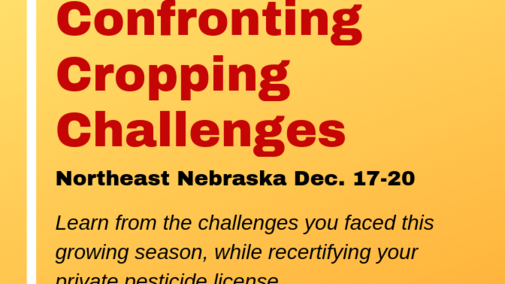A series of meetings this December in northeast Nebraska will focus on information growers need to address crop and pest issues in 2019. The series, Confronting Crop Challenges, also will offer training for private pesticide applicator recertification.
Program Schedule
- West Point – Nielsen Community Center, Monday, Dec. 17, 9 a.m. - noon
- Pender – Community Center, Monday, Dec. 17, 1-4 p.m.
- Columbus – Club Room at Ag Park, Tuesday, Dec. 18, 1-4 p.m.
- Norfolk – Nebraska Extension Office in Madison County (new office at the southeast corner of the junction of Highways 275 and 81), Wednesday, Dec. 19, 1-4 p.m.
- Blair – Public Library, Thursday, Dec. 20, 1-4 p.m.
Program Topics
- Crop Insect Update (soybean gall midge, western bean cutworm, and dectes stem borer)
- Crop Disease Update (gray leaf spot, soybean cyst nematodes, frogeye leaf spot, and Cercospora purple seed stain and blight)
- Hail Know Resources (things to know and places to go after a hail storm)
- Cover Crops 101 (an introduction to cover crops)
- Resistant Weeds Update and Herbicide Carryover
- Private Pesticide Applicator Recertification
Anyone wanting just the crops information can attend the first five sessions and leave. Those needing to renew their private pesticide applicator license (recertification only, not initial certification) will need to also attend the final session to be recertified. Even though this training is being offered in 2018, the recertification period will begin in 2019.
The cost for the program is $10 for the first five sessions. If you need to be recertified, the total cost is $50. The additional $40 is the same fee you would pay to be recertified at a traditional private pesticide applicator training.
Preregistration is appreciated but not required. Register online at croptechcafe.org/ccc or call the Nebraska Extension office in Burt County at (402) 374-2929.
Confronting Cropping Challenges does not replace, but is an alternative to the traditional private pesticide applicator training sessions that will be held in early 2019. For more information on this program, contact your local Nebraska Extension office.

